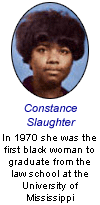GOP Candidates Get Financial Help From Faculty and Administrators at Black Colleges and Universities
 In the last election cycle leading up to the 2004 presidential election, faculty, administrators, and other employees of Harvard University donated $1.1 million to political candidates. Given that black voters tend to overwhelmingly support Democratic candidates, readers might be inclined to predict that political contributions made by faculty, administrators, and other employees of the nation’s historically black colleges and universities would go exclusively to Democratic candidates. But this is not always the case. In the last election cycle leading up to the 2004 presidential election, faculty, administrators, and other employees of Harvard University donated $1.1 million to political candidates. Given that black voters tend to overwhelmingly support Democratic candidates, readers might be inclined to predict that political contributions made by faculty, administrators, and other employees of the nation’s historically black colleges and universities would go exclusively to Democratic candidates. But this is not always the case.
Overall we found that political contributions were made by employees of 48, four-year black colleges and universities in the 2003-04 election cycle. The total amount of contributions from black college employees was only $163,268.
Of the 48 black colleges with political contributors, 28 schools contributed no money whatsoever to GOP candidates. At 20 black colleges and universities, employees did make contributions to Republicans.
At six black colleges and universities, all of the political contributions went to Republican candidates. They were Fisk University, Bethune-Cookman College, Johnson C. Smith University, Stillman College, Lane College, and Morris College. At Fisk, all the contributions were made by then-president Carolynn Reid-Wallace.
At Barber-Scotia College, Tennessee State University, Langston University, Voorhees College, and Hampton University, more than half of all political contributions were to Republican candidates or their affiliated committees.
The Low Completion Rate for Black Students at Community Colleges
In the fall of 2004, nearly 900,000 black students were enrolled in two-year community colleges in the United States. They made up 48 percent of all black students enrolled in higher education that year.
More than 91 percent of all black students enrolled in community colleges attend state-operated institutions.
New figures from the Department of Education show that only a small percentage of entering black students complete their community college program within three years. For black students entering state-operated community colleges in 2001, only 16.6 percent completed a two-year, associate’s degree program by 2004. For whites, 26.3 percent of entering students completed their two-year degree program during the time period.
The small number of blacks at private community colleges did much better. Slightly more than one-half of black students who enrolled at privately operated community colleges completed their studies within a three-year period. For whites at these private community colleges, 62.4 percent earned their degree within the three-year time period.
  |
“Race is a polarizing issue. At private institutions, you have to worry about the alumni. Some support affirmative action, while some insist on colorblindness. Administrators are criticized both for doing too much and for doing too little when they use race as a factor in admissions. It is a no-win situation.”
— Rachel Moran, professor of law at the University of California at Berkeley, in The Winston-Salem Journal, March 9, 2006
|
A Surge in Black Enrollments in Graduate School
Last week JBHE reported that at 23 of the 26 institutions that responded to our recent survey, there were more black women enrolled than black men. But it also is important to note that the gap is more of an issue of race rather than gender. Among whites, women outnumber men at only 11 of the 26 institutions.
In many cases, the racial differences in the gender gap are huge. For example, at Duke University black women make up nearly 63 percent of all African-American enrollments. For whites, women are only 44.8 percent of all white enrollments. This is more than an 18 percentage point difference.
At Johns Hopkins, Columbia, Cornell, the University of Chicago, and Tufts, black women make up more than 60 percent of the total African-American enrollments. But at all these universities white women are outnumbered by white men. At one half of the universities in our survey the percentage of black women enrollments among the African-American student body is more than 10 percentage points higher than the percentage of Caucasian women in the overall white student body.
Very Few Blacks Score at the Highest Levels of the Law School Admission Test
Students seeking admission to the nation’s highest-ranked law schools such as Yale, Harvard, and Stanford have a mean LSAT score of about 170. Data obtained by JBHE from the Law School Admission Council shows that almost no blacks nationwide score at this level.
 In 2004, 10,370 blacks took the LSAT examination. Only 29 blacks, or 0.3 percent of all LSAT test takers, scored 170 or above. In contrast, more than 1,900 white test takers scored 170 or above on the LSAT. They made up 3.1 percent of all white test takers. Thus whites were more than 10 times as likely as blacks to score 170 or above on the LSAT. There were 66 times as many whites as blacks who scored 170 or above on the test. In 2004, 10,370 blacks took the LSAT examination. Only 29 blacks, or 0.3 percent of all LSAT test takers, scored 170 or above. In contrast, more than 1,900 white test takers scored 170 or above on the LSAT. They made up 3.1 percent of all white test takers. Thus whites were more than 10 times as likely as blacks to score 170 or above on the LSAT. There were 66 times as many whites as blacks who scored 170 or above on the test.
Even if we drop the scoring level to 165, a level equal to the mean score of students enrolling at law schools ranked in the top 10 nationwide but not at the very top, we still find very few blacks. There were 108 blacks scoring 165 or better on the LSAT in 2004. They made up 1 percent of all black test takers. For whites, there were 6,689 test takers who scored 165 or above. They made up 10.6 percent of all white students who took the LSAT examination.
The nation’s top law schools could fill their classes with students who scored 165 or above on the LSAT. But if they were to do so, these law schools would have almost no black students. Blacks made up only 1.1 percent of all LSAT test takers who scored 165 or above on the test in 2004.
The data shows the importance of maintaining race-sensitive admissions at our nation’s top law schools. Make no mistake, black students admitted under affirmative action guidelines can handle the curriculum once they are admitted. JBHE surveys of the graduation rates at our leading law schools show that many, if not most, black students who were admitted under affirmative action guidelines graduate at very high rates. In many cases, their graduation rates approach 100 percent, and in almost all cases the black student graduation rate at these law schools is very close to the graduation rate for white students.
Racial Row at the University of Leeds
 Frank Ellis, a professor of Russian and Slavonic studies at the University of Leeds in Britain, recently wrote some racially charged comments in the student newspaper which has caused an uproar on campus. Some students are calling for his ouster but the university, so far at least, has supported the professor’s right to freedom of expression. Frank Ellis, a professor of Russian and Slavonic studies at the University of Leeds in Britain, recently wrote some racially charged comments in the student newspaper which has caused an uproar on campus. Some students are calling for his ouster but the university, so far at least, has supported the professor’s right to freedom of expression.
In the article Ellis called himself “an unrepentant Powellite.” He was referring to the late Tory politician Enoch Powell who warned that England rivers would run red with blood if the government did not take steps to control immigration of racial minorities. Ellis also wrote that he supported the thesis in The Bell Curve that white people were generally more intelligent than blacks.
It is somewhat remarkable that the controversy has simmered under the surface for so long. Professor Ellis’ views have been widely published and available on the Internet for many years. In 2000 he spoke at the American Renaissance conference in Virginia, a biennial gathering of academic racialists.
That same year, in an article published in the conservative London political magazine Right Now!, Ellis wrote, “It is considered politically incorrect to say so, but were one to take the ‘white’ and the ‘male’ out of science and technology, one would have no science, just witchcraft, third world squalor, misery and mega-incompetence.”
University of Massachusetts Seeks to End Racial Self-Segregation in Campus Housing
 The University of Massachusetts is seeking to end self-imposed student segregation in university housing. Students of different ethnic groups have tended to congregate in separate areas of campus. The self-segregation has become so entrenched that one residential area on campus preferred by Asian students is known as “Chinatown.” A residential cluster where many black students choose to live is commonly referred to on campus as “The Projects.” The University of Massachusetts is seeking to end self-imposed student segregation in university housing. Students of different ethnic groups have tended to congregate in separate areas of campus. The self-segregation has become so entrenched that one residential area on campus preferred by Asian students is known as “Chinatown.” A residential cluster where many black students choose to live is commonly referred to on campus as “The Projects.”
The university will now end its practice of setting aside certain floors of dormitories for particular racial or ethnic groups. The university will also take steps to ensure that incoming freshmen are dispersed throughout the campus without regard to race. The university said that it plans to discourage students from self-segregating with the rooming choices, but it is unclear at this time how this will be accomplished.
Princeton Theological Seminary

Princeton Theological Seminary invites applicants for a tenured faculty position in any department of Seminary instruction, with particular expertise in African-American women’s perspectives. The position requires a distinguished scholar holding the Ph.D. or its equivalent, preferably at the full professor level. Candidates should possess a teaching and publication record in one’s field that demonstrates competence in Africa-American women’s experience, theology or spirituality; have a broad knowledge of religious and Christian traditions; demonstrate ecclesial commitment; be prepared to work in a Reformed Seminary within an ecumenical environment; and bring diverse methodologies (from philosophy, literary criticism, history, cultural studies, ethnography, political theory, or social science) to bear on theological issues and the strengthening of Christian faith. Candidates will also be considered who specialize in women’s perspectives in Africa or from the African diaspora, provided they have extensive cultural and research experience in African-American communities of the U.S.
Princeton Theological Seminary is an equal opportunity employer.
The appointment will begin July 1, 2007; the preliminary deadline for applications is September 15, 2006. Both applications and nominations of qualified candidates may be addressed to the Dean of Academic Affairs, Princeton Theological Seminary, P. O. Box 821, Princeton, NJ 08542, or to academic.dean@ptsem.edu. More information about this position is available on the Seminary’s website, www.ptsem.edu.
Speculation Continues to Swirl About Who Will Be the Next President of Harvard University
Who finally wins the Harvard presidency will have a critical effect on black educational opportunities throughout the nation. Should Harvard in the future abandon or cut back on affirmative action, so will scores of other important educational institutions in our country. If Harvard, under its new president, ceases to attract and actively recruit black faculty, similar policies will be followed by other highly ranked colleges. If Harvard abandons or dilutes its famed black studies effort, other colleges and universities will undoubtedly follow suit. And what policies Harvard sets in place will largely be determined by the racial attitudes of its next president.
So it remains important to black Americans to follow the progress of the process of selecting the next president of Harvard University. Most of the people who have been identified as top candidates for the job are unwilling to talk about the matter.
 Brown University president Ruth Simmons, considered a leading candidate for the job, put out a statement saying, “The president’s office declines to comment on any speculation about leadership issues at Harvard.” Amy Gutmann, president of the University of Pennsylvania, simply told the Daily Pennsylvanian, “I plan to be here for the foreseeable future.” Other leading contenders including Elena Kagan, dean of Harvard Law School, and Drew Gilpin Faust, dean of the Radcliffe Institute of Advanced Study, have been unavailable for comment. Brown University president Ruth Simmons, considered a leading candidate for the job, put out a statement saying, “The president’s office declines to comment on any speculation about leadership issues at Harvard.” Amy Gutmann, president of the University of Pennsylvania, simply told the Daily Pennsylvanian, “I plan to be here for the foreseeable future.” Other leading contenders including Elena Kagan, dean of Harvard Law School, and Drew Gilpin Faust, dean of the Radcliffe Institute of Advanced Study, have been unavailable for comment.
Nannerl O. Keohane, former president of Duke University who now teaches at Princeton, took herself out of the running saying simply, “I am not available. I want to tell people to please stop putting me on the lists of potential candidates.”
Appointments
 • Robin D.G. Kelley was named professor of history at the University of Southern California. He will also teach in the university’s program in American studies and ethnicity. Kelley, who is working on a biography of Thelonius Monk, was a professor of anthropology at Columbia University. • Robin D.G. Kelley was named professor of history at the University of Southern California. He will also teach in the university’s program in American studies and ethnicity. Kelley, who is working on a biography of Thelonius Monk, was a professor of anthropology at Columbia University.
Kelley is a graduate of California State University at Long Beach. He holds a master’s degree and a Ph.D. in U.S. history from UCLA. Before coming to Columbia in 2003, he was chair of the history department at New York University.
• George French Jr., who has been serving as acting president and interim president since the death of Albert Sloan this past November, was named the thirteenth president of Miles College, the historically black liberal arts institution in Fairfield, Alabama. Before taking over the duties of the president’s office, French was the director of institutional planning and development. The college enrolls about 1,700 students, more than 97 percent of whom are black.
Grant
• Hampton University, the historically black educational institution in Virginia, received a two-year, $200,000 grant from the National Science Foundation to establish an undergraduate research program in nanotechnology. The research effort will be under the direction of Jale Akyurtlu, a professor of chemical engineering at Hampton.
|
The Higher Education of the Nation’s Most High Achieving Black Women in Business
 Recently Black Enterprise magazine published its list of the 50 most powerful black women in business. JBHE has checked their academic backgrounds and found that all but one of the African-American women on the Black Enterprise list have earned a college diploma. A large number of these black women hold one or more graduate degrees. Recently Black Enterprise magazine published its list of the 50 most powerful black women in business. JBHE has checked their academic backgrounds and found that all but one of the African-American women on the Black Enterprise list have earned a college diploma. A large number of these black women hold one or more graduate degrees.
Seven of the women are graduates of black colleges whereas eight are alumnae of Ivy League colleges. Sixteen of these black women executives hold graduate degrees from Ivy League universities and eight of these are Harvard alumnae. Seven of these women hold a graduate or undergraduate degree from Northwestern.
More than half of the women executives hold an MBA. Six hold law degrees. Janice Bryant Howroyd, CEO of Act 1 Group, is the only one of the 50 top black women executives to hold a Ph.D.
Black Studies at Harvard Adds a Host of New Black Faculty
 During the Lawrence Summers years at Harvard the university’s black studies department saw the departure of several high-profile black academics including Cornel West, Lawrence Bobo, K. Anthony Appiah, Michael Dawson, Gwendolyn DuBois Shaw, and Marcyliena Morgan. Summers had no interest in black studies. His attitude was clear to all, and there was a serious erosion of Harvard’s best. During the Lawrence Summers years at Harvard the university’s black studies department saw the departure of several high-profile black academics including Cornel West, Lawrence Bobo, K. Anthony Appiah, Michael Dawson, Gwendolyn DuBois Shaw, and Marcyliena Morgan. Summers had no interest in black studies. His attitude was clear to all, and there was a serious erosion of Harvard’s best.
But Henry Louis Gates Jr., who is stepping down as chair of the department of African and African-American studies at the end of this academic year, has produced a flurry of hiring activity in recent weeks. The following four professors have been offered and have accepted tenured positions in the department:
- James Sidanius, who earned his Ph.D. at the University of Stockholm, has already started teaching at Harvard. He holds a joint appointment as a professor of psychology and a professor of African-American studies. He previously taught at UCLA.
- Jacob K. Olupona, a professor of African religion at the University of California at Davis, will hold a joint appointment with the black studies department and the Harvard Divinity School.
- Biodun Jeyifo, a professor of English at Cornell University, is spending the current semester conducting research in Nigeria. He holds a master’s degree and a Ph.D. from New York University.
 Kofi Agawu is a professor of music at Princeton University. He is a graduate of Reading University, holds a master’s degree from King’s College in London, and earned his Ph.D. at Stanford University. Next fall he will have a joint appointment with the African and African-American studies and music departments at Harvard. Kofi Agawu is a professor of music at Princeton University. He is a graduate of Reading University, holds a master’s degree from King’s College in London, and earned his Ph.D. at Stanford University. Next fall he will have a joint appointment with the African and African-American studies and music departments at Harvard.
 In addition to these scholars, Claudine Gay, a black scholar with a master’s and Ph.D. from Harvard, is currently teaching at Stanford University. She has accepted a tenured post in Harvard’s department of government. It is likely that she will also teach in black studies. In addition to these scholars, Claudine Gay, a black scholar with a master’s and Ph.D. from Harvard, is currently teaching at Stanford University. She has accepted a tenured post in Harvard’s department of government. It is likely that she will also teach in black studies.
Professor Gates is also negotiating to bring to Harvard Brent H. Edwards, an associate professor of English at Rutgers University, and Saidiya V. Hartman, an associate professor of English at the University of California at Berkeley.
Stanford Increases Financial Aid for Low-Income Students
 Following in the footsteps of Harvard, Princeton, and several other of the nation’s highest-ranking colleges and universities, Stanford has beefed up its financial aid program for low-income students. Students from families whose incomes are $45,000 or below will have the complete cost of their education covered by scholarship grants. During the current academic year, students from families with incomes below $45,000 were asked to pay an average of $2,650 toward their education. This forced many students in this income bracket to work while they were enrolled in college or to assume debt. Following in the footsteps of Harvard, Princeton, and several other of the nation’s highest-ranking colleges and universities, Stanford has beefed up its financial aid program for low-income students. Students from families whose incomes are $45,000 or below will have the complete cost of their education covered by scholarship grants. During the current academic year, students from families with incomes below $45,000 were asked to pay an average of $2,650 toward their education. This forced many students in this income bracket to work while they were enrolled in college or to assume debt.
Stanford University’s new financial aid program will also be more generous to students whose family income falls in the $45,000 to $60,000 range. The average family contribution for families in this income bracket will be cut in half.
The new financial aid package will go into effect this September for the 2006-07 academic year. All new and continuing undergraduate students will be eligible for the new aid program. Stanford expects the new program will add about $3 million to its $66 million financial aid budget.
Stanford University has an endowment of $12.2 billion. At a conservative rate of return of 10 percent, Stanford earns enough income from its endowment in one day to pay for the increase in its financial aid program.
The Trend in Black Student Graduation Rates At the Nation’s Highest-Ranked Universities
 In recent issues we have reported the latest available data on the current graduation rates of black students at the nation’s most prestigious colleges and universities. We now examine the long-term trend in black graduation rates at these institutions. In recent issues we have reported the latest available data on the current graduation rates of black students at the nation’s most prestigious colleges and universities. We now examine the long-term trend in black graduation rates at these institutions.
Of the 27 high-ranked universities for which JBHE has long-term college completion data, the black graduation rate has improved at 25 institutions. One of the most impressive gains is the 18 percentage point increase in the black student graduation rate at Carnegie Mellon University. There, the four-year average black graduation rate rose from 47 percent in 1998 to 65 percent in 2005.
Similarly impressive gains in black student graduation rates occurred at the University of Pennsylvania, Rice University, UCLA, and Columbia University. Each university has seen its black student graduation rate improve by at least 13 percentage points over the 1998 to 2005 period.
At Tufts University the black graduation rate dropped from 82 percent in 1998 to 80 percent in 2005. The University of Virginia was the only other high-ranking university to show a percentage point decline in its black student graduation rate over the past seven years.
  |
2,127 The number of professional degrees awarded to black men in the United States in the 2003-04 academic year.
3,508 The number of professional degrees awarded to black women in the United States in the 2003-04 academic year.
source: U.S. Bureau of the Census
|
The Future of Race-Based Scholarships in Higher Education
 Recently, The New York Times published a front-page story noting that large numbers of colleges are now offering scholarships to whites that previously had been earmarked exclusively for blacks. This is in response to legal threats from right-wing groups that are making every effort to undercut affirmative action. Recently, The New York Times published a front-page story noting that large numbers of colleges are now offering scholarships to whites that previously had been earmarked exclusively for blacks. This is in response to legal threats from right-wing groups that are making every effort to undercut affirmative action.
The Times story is old hat. JBHE has been on the case for years.
On several occasions JBHE has published a list of private scholarships earmarked for blacks. These scholarships are all private in nature and in many cases are set up by concerned citizens under private wills and trusts.
Does the current interpretation of the law mean that all of these scholarships will have to be abandoned or opened to whites, contrary to the intent of the donors?
Why are scholarships based on race so important? New evidence shows that eliminating the racial requirement can have a profound negative impact on opportunities for blacks even when other qualifying requirements are added. In 2005 Washington University in St. Louis decided to open up its black-only scholarships to students of all races. This year, the first under the new guidelines, 12 of the 42 scholarship recipients are white.
University of Mississippi Law School Looks to Increase Black Enrollments
 The University of Mississippi School of Law did not graduate its first black student until 1967. Now, nearly 40 years later, blacks are slightly more than 8 percent of the student body. This progress must be considered in light of the fact that blacks are now more than 36 percent of the population in the state of Mississippi. There are some 500 black lawyers in Mississippi, about 7 percent of all attorneys in the state. The University of Mississippi School of Law did not graduate its first black student until 1967. Now, nearly 40 years later, blacks are slightly more than 8 percent of the student body. This progress must be considered in light of the fact that blacks are now more than 36 percent of the population in the state of Mississippi. There are some 500 black lawyers in Mississippi, about 7 percent of all attorneys in the state.
In order to increase racial diversity on campus, the University of Mississippi law school is mounting a new effort. Recruiters are being sent to historically black colleges and universities throughout the South. In addition, scholarship money for low-income students has been increased. Efforts are also under way to bring more black faculty to campus which, it is hoped, will in turn make it easier to attract black students.
The efforts are showing signs of progress. The current first-year class at the law school is 13 percent black, up from 7 percent a year ago.
Board Picks Insider as New Head of the Southern University System
 Ralph Slaughter was selected as the new president of the Southern University system in Louisiana. The system, which encompasses campuses in Baton Rouge, Shreveport, and New Orleans, and a law school, enrolls about 15,000 students, the vast majority of whom are African Americans. Ralph Slaughter was selected as the new president of the Southern University system in Louisiana. The system, which encompasses campuses in Baton Rouge, Shreveport, and New Orleans, and a law school, enrolls about 15,000 students, the vast majority of whom are African Americans.
Slaughter was the vice president for administration and management for the Southern University system, and many board members were comfortable with someone who knew the university well as it struggles with rebuilding efforts following Hurricane Katrina, particularly at the New Orleans campus.
Slaughter was chosen from a field of 23 candidates that was narrowed to three finalists. Other candidates given serious consideration were A. Toy Caldwell Colbert, professor and consultant to the president at Howard University, and Lester Newman, president of Mississippi Valley State University.
A native of Port Allen, Louisiana, Slaughter is a graduate of Southern University. He holds a master’s degree in public administration from Louisiana State University and a doctorate in public policy from Southern University.
Fraternity at Florida A&M May Be First to Be Prosecuted Under Anti-Hazing Statute
 The Kappa Alpha Psi fraternity was suspended and placed on inactive status at Florida A&M University after it was revealed that a pledge had been seriously injured during a hazing incident. The student was allegedly beaten with canes on four successive nights. One of the student’s cuts required 25 stitches. The student’s father brought the matter to the attention of authorities when his son returned home to nurse his wounds, which will cause him to miss the remaining classes this semester. The Kappa Alpha Psi fraternity was suspended and placed on inactive status at Florida A&M University after it was revealed that a pledge had been seriously injured during a hazing incident. The student was allegedly beaten with canes on four successive nights. One of the student’s cuts required 25 stitches. The student’s father brought the matter to the attention of authorities when his son returned home to nurse his wounds, which will cause him to miss the remaining classes this semester.
After a 2001 hazing incident at Florida A&M resulting in kidney failure to a pledge and a $1.8 million damage award, the Florida legislature passed a law making serious injury or death resulting from hazing a felony, punishable by up to five years in prison. To date, no one has been prosecuted under the law.
Awards
• The University of Arkansas has established the Silas Hunt Legacy Awards to honor distinguished black alumni of the university. In 1948, Hunt, a law school student, was the first African American to enroll at the university since Reconstruction. He died from tuberculosis in 1949 before earning his degree.
The 10 recipients of the initial Silas Hunt Legacy Awards are:
- Gerald Alley, CEO of Con-Real Support, a real estate and construction firm in Texas
- Margaret Clark, one of the first black faculty members at the University of Arkansas
- Randall Ferguson, a recently retired executive at IBM
- George W. Haley, the second black graduate of the law school and a leading attorney in the field of international law
- E. Lynn Harris, the author of six best-selling novels
- Edith Irby Jones, the first black graduate of the School of Medicine and the first woman president of the National Medical Association
- Bobby W. Jones, deputy commander of the 67th combat support hospital in Tikrit, Iraq, during Operation Iraqi Freedom
- Janis Kearney, the personal diarist of President Bill Clinton
- Gordon Morgan, university professor of sociology at the University of Arkansas
- Rodney Slater, attorney and former U.S. secretary of transportation
|

